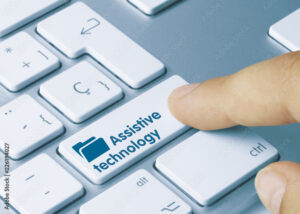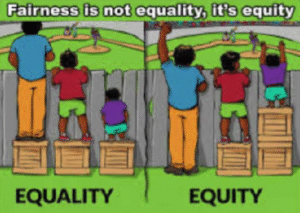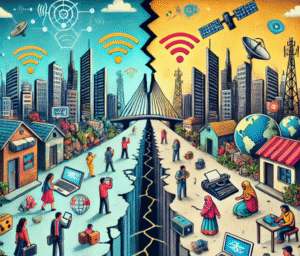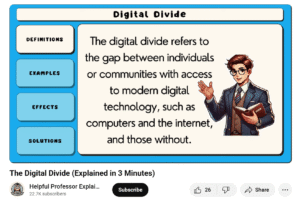 This week Sarada and Chi confidently argued that yes, technology has led to a more equitable society, while Danielle and Jillian expertly opposed this statement. Both groups presented valid points, shared proven data and provided ample resources to support their side of the (as always) controversial debate topic, resulting in very mixed opinions (mine included!). I’ll admit that this debate topic stumped me the most thus far; when it was time for the pre-vote I had to fully PAUSE and consider my vote, unlike previous debate topics where I went into the vote pretty confident of my opinion.
This week Sarada and Chi confidently argued that yes, technology has led to a more equitable society, while Danielle and Jillian expertly opposed this statement. Both groups presented valid points, shared proven data and provided ample resources to support their side of the (as always) controversial debate topic, resulting in very mixed opinions (mine included!). I’ll admit that this debate topic stumped me the most thus far; when it was time for the pre-vote I had to fully PAUSE and consider my vote, unlike previous debate topics where I went into the vote pretty confident of my opinion.
Yes, technology = equity!

Chi and Sarada started the debate strongly with their opening statement video that emphasized technology’s ability to create equity through digital tools to enhance learning, widespread initiatives, and specific supports for learners with diverse learning and physical disabilities. I found the latter point impactful – technology definitely supports inclusive learning environments for learners that need assistive technologies for a variety of reasons such as a hearing impairment, learning disability or motor function restriction. The article Unlocking potential: How assistive technology empowers students with intellectual disabilities, gave a nice overview of assistive technologies and their incredible abilities to address diverse needs. It’s undeniable that assistive tech creates equity among learners, in schools, but what about in society overall?
Throughout the open debate, we heard further support to the ‘agree’ side such as, technology providing possibilities for higher education (us all benefitted from an online summer class being a prominent example) and the implications for more widespread healthcare access. The article, Will AI Solve The World’s Inequality Problem – Or Make It Worse?, suggests the inclusive possibilities for many essential services: “Access to cheaper, more nutritious food, better quality accommodation and improved education services could potentially help people become healthier and lift themselves out of poverty and deprivation on a societal scale.” This article also discusses AI’s role concerning equity, highlighting many ways it’s actually increasing inequity – through automation of low-income jobs, inherent AI biases and lack of tech resulting in no AI access – but ends with a hopeful note: “as well as the potential for AI to exacerbate inequality, it also has the capacity to create a more equitable society.”

One of Chi and Sarada main points was that there is a growing number of global initiatives happening to increase equity, through low-cost internet options and more widespread access to technology. The article, How Technology Can Advance Social Justice To Fight Inequality, provides concrete examples of real initiatives happening and lists specific online tools and programs available that are combatting inequity. It provides lists of advocacy websites, educational programs, communication tools, reporting systems, virtual reality options and AI tech that are all reducing inequity. Of course, I see a lot of value in technology that can address inequity, and in specific initiatives helping bridge the gap, but I still question are these things enough to confidently support the claim that tech = equitable society?
Ultimately, this side argued that technology is (or can be) a powerful means used to address inequity, thus resulting in a more equitable society overall. They acknowledge that no, technology isn’t addressing inequity ‘perfectly’ but it is helping dismantle barriers that exist. Through the class discussion and my own exploration of their resources to support this claim, I can see the potential here.
No, technology does not = equity!

Jillian and Danielle’s opening statement video challenged the ‘pro’ points. Their argument was based on the idea that equality and equity aren’t the same thing, saying that technology, while sometimes creating equality (ie. in schools, students all get a laptop to use), is not promoting equitable solutions where each individual is getting what they need overall. They emphasize the immense inequity in technology access, infrastructure and ability, stating that technology use is actually promoting exclusion ‘disguised as progress’ and reiterating that potential does not equate to progress. I found these points powerful and they *popped* the optimistic bubble of technology’s ‘potential;’ to create equity that Chi and Sarada had encouraged. In reality, technology use and access is a much more complex issue that, while it can/does do incredible things to promote inclusion, seems to actually create more inequity overall.
This group discusses COVID as a clear example of the inequity in technology, supporting this with the article The digital divide and COVID‑19: Teachers’ perceptions of inequities in students’ internet access and participation in remote learning. Having experienced the ‘COVID years’ in the classroom, I can attest to the inequity that this global pandemic illuminated. Suddenly it was clear who had (working) technology at home and who didn’t. Which families had Internet access, which families were fluent with tech, which families had work flexibility to ensure online school happened, and the list continues. While my school was quick to offer laptops to those needing them, this didn’t even begin to address the inequity that still existed in all of the other domains required for successful technology use. Other barriers such as language and age also impacted student learning.

Another stand out point from the article Digital inclusion and the global tech divide: How the digital revolution is leaving some of us in the digital dark ages, was the concept of information poverty: “[t]his technological gap leads to what researchers term “information poverty,” where people are sidelined from social, political, and economic participation due to unreliable or hard-to-reach digital platforms.” This article discusses the implications on a global scale to an inequitable tech world including many areas being more susceptible to damaging cyber attacks, wide spread of misinformation, and ease of propaganda promotion, suggesting that “[b]ridging the gaps in digital infrastructure is essential for balancing global power dynamics and promoting a more stable and equitable digital environment. How do we turn inclusion into empowerment?”
The digital divide: hard to deny
Chi and Sarada argued this divide is shrinking, while Danielle and Jillian used the digital divide as their more prominent point for why technology does NOT lead to an equitable society. The ‘no’ side mentions the severe impacts the growing digital divide has on many groups such as low income populations, rural communities, and non-English speaking citizens. The disagree team shared a great 3-minute overview of the digital divide, which states the digital divide is “perpetuating cycles of poverty and unemployment.”
From the article Digital inclusion and the global tech divide: How the digital revolution is leaving some of us in the digital dark ages, I agree that “[d]espite technology’s ability to connect and empower, millions worldwide are still excluded from its advantages.” Of course the digital divide isn’t something we can fix overnight as it has been established over decades and decades of new tech, increasing as technology continues to advance at rapid speed. The same resources suggests that “[t]his “digital divide”—the disparity between those with access to modern information and communication technologies (ICT) and those without—extends far beyond merely lacking the latest smartphone or not having social media accounts.” To avoid feeling helpless in such a major issue, I consider what role I can play to (begin to) address tech inequities in my own world: education seems to be the only answer.
A call for digital literacy to address an inequitable tech world
The article, Digital Inclusion and the Global Tech Divide: How the Digital Revolution is Leaving Some of Us in the Digital Dark Ages, states “[b]ridging the digital divide involves more than providing internet access; it requires ensuring individuals are skilled in its use. Digital literacy is essential for engagement in today’s economy.” After the debate, it was clear that education on technology use is the most important step to reducing the digital divide in our communities. While the ‘agree’ team instilled a lot of hope for the equitable abilities technology can offer, I maintain my view that technology does not lead to a more equitable society (yet). I think progress is happening (more and more each day!) and I think technology’s potential to combat inequities is there…but there is a LOT of work to do.
So…agree or disagree?
I appreciated Katia’s statement on the layers of inequity that are near impossible to untangle in this discussion. How can we unpack all of this? Is the technology causing inequity or are other policies to blame? How can we determine whether it’s really a tech issue or if technology is just playing a small role in larger, more complex societal issues? I think while technology is not the sole cause of societal inequity, it is not doing enough to lead us into a more equitable state. Technology is simply mirroring the larger issues in society already: from the article The Impact of Digital Inclusion on Social Equity: “[t]his divide often mirrors and exacerbates existing social inequalities, with marginalized groups, including low-income families, rural communities, and minorities, being disproportionately affected.”
To conclude, I look to some words of wisdom from The Impact of Digital Inclusion on Social Equity:
“Digital inclusion is not just about technology; it is about creating opportunities for all individuals to participate fully in society and the economy. By addressing the digital divide and promoting digital literacy, we can make significant strides toward social equity. As digital technologies continue to advance, ensuring that everyone has the opportunity to benefit from these advancements is crucial for building a more equitable and inclusive society.”
How do we begin to tackle this? Well that would definitely need to be another blog post!
Thanks for reading my (lengthy) thoughts on debate #5 – I think this topic challenged my thinking the most this semester. Looking forward to reading your reflections! 🙂
- Teagan

4 Comments
Sarada Dhakal
Hey Teagan,
Thank you for such a thoughtful and nuanced reflection on this week’s debate. I would respectfully like to add and reaffirm my perspective in support of the idea that technology is indeed leading us toward a more equitable society, even if we are not quite there yet.
Let’s be honest. Complete equity has never existed in any era, and expecting technology to fully erase all social, economic, or political disparities may be idealistic. But what technology has done is reduce the gap that was even wider before its existence. The phrase “more equitable” itself suggests progress, not perfection. It is not about achieving a perfect society. It is about moving toward something better.
Take the COVID pandemic for example. We often focus on the students who were left behind due to lack of devices or internet (and rightly so), but we rarely talk about the millions who did have access and were able to continue learning, even from remote villages, thanks to online platforms. That access would not have existed twenty years ago. That is equity in action, even if it is partial.
I come from Nepal, an underdeveloped nation, and I have seen firsthand how technology has opened up access to education, trade, healthcare, and job opportunities. Small entrepreneurs now sell products online. Students in remote areas learn English and coding through YouTube. People raise their voices through social media when they were previously ignored. These are not theories. This is real change.
A basic android phone today can give students access to global knowledge that was once locked behind expensive books or big city universities. The cost of data remains a barrier, yes, but imagine what a policy shift to reduce internet costs could do. If governments focus on the underserved instead of catering to the already privileged, technology could become the greatest equalizer of our time.
Let’s be clear. Technology as a tool has not created inequity. The issue lies in who controls and distributes access. It is the responsibility of institutions and leaders to ensure that investment reaches rural, poor, and marginalized communities. The potential is already there. We just need better infrastructure and political will to unlock it.
In conclusion, I believe that while technology alone cannot solve inequality, it is already a powerful driver of more equitable opportunities, especially when paired with inclusive and forward-thinking policies. As someone born and raised in a developing country, I have witnessed this change firsthand. And I believe it is only the beginning.
Sarada
Dustin Hubick
Thanks, Teagan, for a thorough recap on the debate and for highlighting the difficulty that lies within this topic. Technology has greatly enhanced inclusivity in education. I believe technology is a means to equity, but as you hinted, other societal issues are impacting the quest for equity. Technology does well to highlight the inequality in our world, and COVID-19 was the litmus test. I can recall devices like Chromebooks and mobile hotspots being distributed to the students without said tools. Unfortunately, some devices got damaged/lost, and data plans were maxed out in days. What did school/government officials think would happen when you gave ‘high-speed’ internet access to a student who never had that access prior? I don’t think we have reached our destination, but we are on the trail.
Teagan Schiltz
Thanks for the comment Dustin. I agree – on the right track (in some ways) but a lot of work awaits if we can truly say technology creates a more equitable society. That’s a good point regarding the issues that occured in COVID – without any prior education, or any sort of preparation, we really set up kids for failure throwing them into a tech-based education world where, of course, many struggled. Appreciate your thoughts here- thank you.
Teagan
Danielle
Now that’s a blog post!!! Haha. Your post really captured the complexity of this topic. I appreciated how you didn’t just pick a side but instead looked at the layers involved in the equity vs. technology conversation.
Because I was on the disagreeing side, I really resonated with a lot of what you said, especially around how access doesn’t always mean equity. The digital divide is more than just handing out devices; it’s about access, digital literacy, language, infrastructure, and support. I also liked how you highlighted both the potential and the danger in placing too much hope in technology. That line about assistive tech being powerful in schools but not necessarily a fix for broader inequities really stuck with me.
You wrapped it up perfectly with the reminder that digital inclusion is ultimately about opportunity, not just devices. Thanks again for the deep dive, I’d absolutely read your follow-up blog post on how we start tackling it! Have a great summer Teagan!